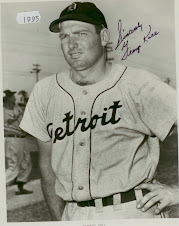A starting pitcher for three minor leaguers? Does that really move us forward?
We need a closer: a proven closer.
Maybe Rondon is ready. Maybe they have faith in Smyly. Maybe Santa will be good to us.
I'm a died in the wool AL fan, but has anybody even heard of these guys?
Subscribe to:
Post Comments (Atom)























Dombrowski usually makes good trades. If he could have gotten more for Fister he would have. I bet scouts saw something in his performance that worried them. And they're not all minor leaguers. The deal lets Smyly move into the rotation, which will be a good move. And I know Dombrowski isn't done making moves.
ReplyDeleteYou're probably right, Tom. Appears the Freep agrees with you.
ReplyDeleteDrew Sharp: Tigers' GM Dave Dombrowski has earned benefit of doubt on Doug Fister trade
Considering Dave Dombrowski’s penchant for fleecing those willing to trade with him, any initial shock and disappointment over the Tigers parting with Doug Fister on Monday night should be balanced with the likelihood that Dombrowski saw something in the two anonymous 22-year-old left-handed pitchers that will turn this deal with Washington into a plus-acquisition for the Tigers.
The general manager’s track record earns him the benefit of the doubt. After all, wasn’t the overriding response when Dombrowski acquired Fister from Seattle at the trading deadline two years ago “Doug who?”
It’s not easy breaking up one of the majors’ best rotations, but Dombrowski has the delicate balance of maintaining a high-priced, star-driven World Series contender while gaining more salary flexibility with solid, inexpensive players to keep those stars in Detroit.
“We’re not cutting payroll,” Dombrowski said adamantly during a teleconference late Monday.
Rest easy, everybody. This wasn’t a salary dump. It’s more a salary redistribution. Although the Tigers appear likley to maintain one of the top-five payrolls, they must find the necessary savings with Max Scherzer and Miguel Cabrera soon approaching free agency and the realization that ownership’s willingness to extend the budget like a biggest-revenue franchises probably won’t last much longer.
The Tigers got a little better for a lot cheaper by acquiring utility player Steve Lombardozzi, left-handed reliever Ian Krol and minor-league left-handed starting prospect Robbie Ray, who possesses the highest upside of the three.
Dombrowski, as president and GM, called Ray a young power pitcher “at the doorstep” of joining the majors. He referred to Krol, who appeared in 32 games for the Nationals last season, as a No. 1 lefty out of the bullpen, a strikeout pitcher with an above average fastball and quality curveball.
“It’s very hard getting young pitching like Ray and Krol,” he said. “We knew that the cost would be something good.”
The Tigers had two starters — Fister and Rick Porcello — with two years of arbitration eligibility before free agency. That’s the time to trade somebody to maximize their trade value. Teams are less likely to part with a bigger package if they’re potentially only renting a player for a single year
Fister probably would have gotten a 2014 salary around $7 million, a deserving raise for a 14-game winner. But if Drew Smyly comes reasonably close to that season while giving Detroit a lefty starter at a price tag closer to the league minimum, then that’s a huge advantage for the Tigers.
Dombrowski isn’t done, reminding reporters that the calendar only read Dec. 2. There’s plenty of time and now extra resources to sign a closer and a better offensive option in leftfield.
But the bottom line with the Fister exodus was that despite still having what Dombrowski called perhaps the most generous owner in all of sports in Mike Ilitch, the Tigers cannot operate within a limitless budget. They want to win championships, but they can’t keep everybody. Difficult choices must be made, regardless of their initial unpopularity.
This is one of those occasions where everyone should trust Dombrowski and his scouting department. Considering how he found Fister, traded for a Cy Young winner in Scherzer and unloaded the majority of Prince Fielder’s contract, which nobody thought was possible, he has more than earned the public’s trust with this latest venture into the trading unknown.